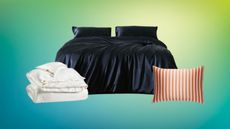What is temporary wallpaper and is it safe to use in a rental? These experts explain
Temporary wallpaper is a hassle free, renter-friendly alternative to traditional wallpapering. Here's how it works
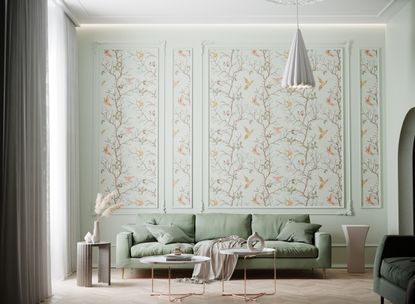

Temporary wallpaper probably sounds very appealing if you're decorating an apartment, especially if you're not a homeowner. Renting can be very restrictive, particularly if your property comes furnished, so any opportunity to add your own stylistic flair without committing to permanent changes or risking future damage is a win.
We've all been there at some point. Drab walls? Unattractive paint shade? A total lack of color? These things are difficult to change without a proper renovation. Well, that's where temporary wallpaper comes in. Sometimes known as peel and stick wallpaper, this clever little design innovation claims to be easy to install and easily removable, without any hassle or damage to your wall's paint work. But can we trust it?
Luckily, we've done some digging so you don't have to risk your deposit in order to find out. Here, we take a look at how temporary wallpaper works and whether it's really safe for your walls, including some expert advice from trusty designers as well as the manufacturers of removeable wallpapers themselves.

Lilith is an expert at following news and trends across the world of interior design. She's committed to helping readers make the best design choices in their homes, including rentals, by offering practical tips and guides. For this piece she asked designers and wallpaper manufacturers all about temporary wallpaper and whether it's really a safe choice for our walls.
What is temporary wallpaper and how does it work?
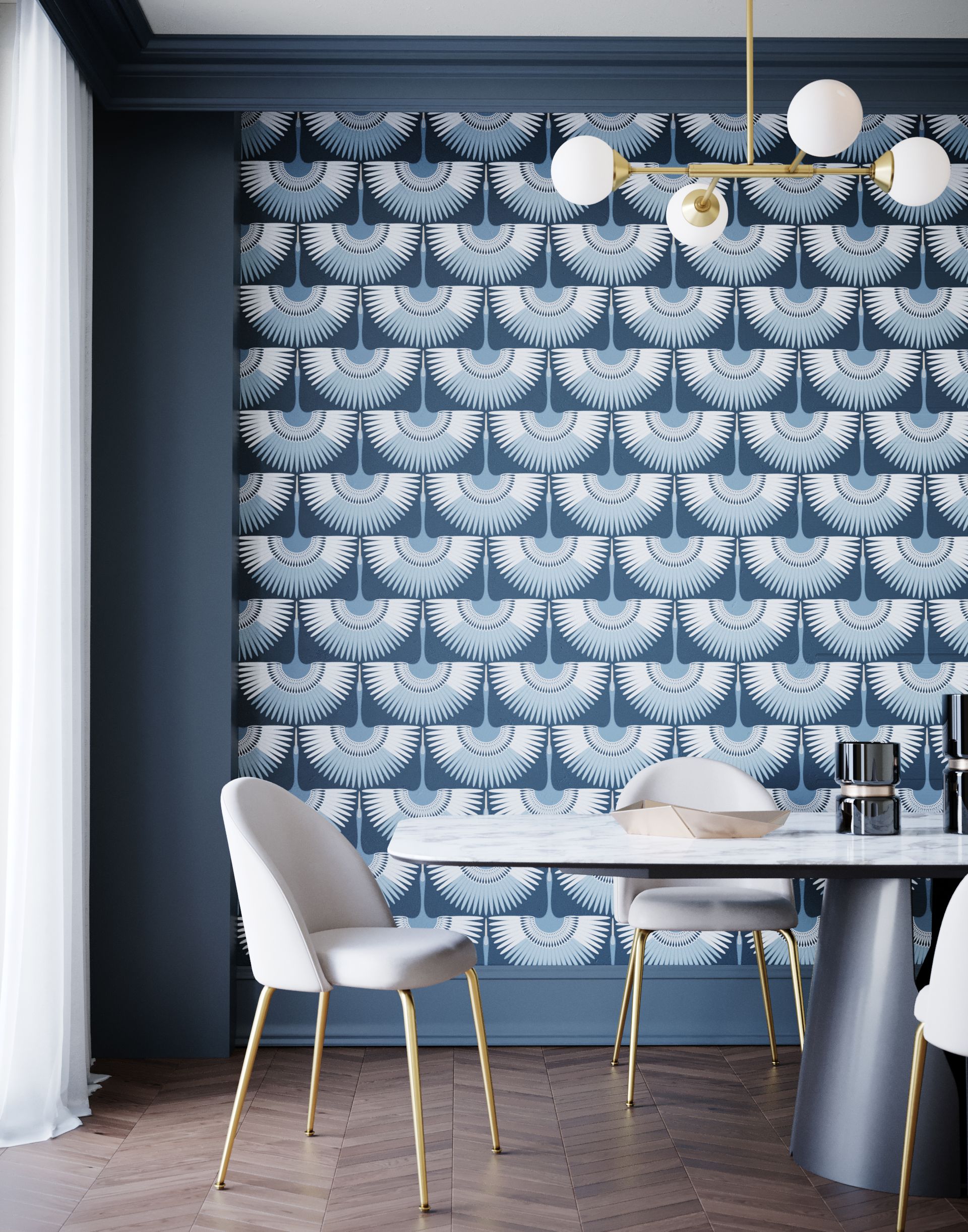
While the name itself is pretty self explanatory, you might be wracking your brain to figure out how temporary wallpaper actually works. We all know that regular wallpaper ideas aren't the easiest job to carry out, and removing them is even more difficult; all that soaking and scraping is tiring. So, how does temporary wallpaper stick to your walls and, more importantly, how do you remove it?
Each brand's wallpaper will differ slightly but in most cases, they're a self-adhesive paper which sticks to your walls without the need for a paste. 'Our removable paper is a smooth, PVC free, non toxic, natural latex saturated, cellulose based paper that is backed with non toxic pressure activated adhesive,' explains Nathan Turner Co-creative Director at Wallshoppe. 'You can easily peel back the liner, place the paper on the surface and use a soft spatula or a roller to activate the adhesive.'
Wallpops' removeable wallpapers work in a similar way. 'Our designs are printed on a premium vinyl substrate and finished with a specially formulated adhesive that's strong enough to last until you decided to take your wallpaper down, but gentle enough to prevent damaging your walls,' says WallPops Content Marketing Manager, Jennifer Daltorio.
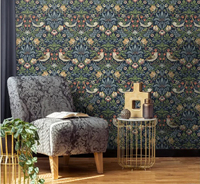
Britiany Peel & Stick Floral Wallpaper, at Wayfair
Breathe new air into a lacklustre space with this elegant floral wallpaper design. The peel and stick paper promises the same quality and durability as permanent wallpaper, minus the commitment. No paste, no mess, no sticky residue - what's not to love?
What are the benefits?
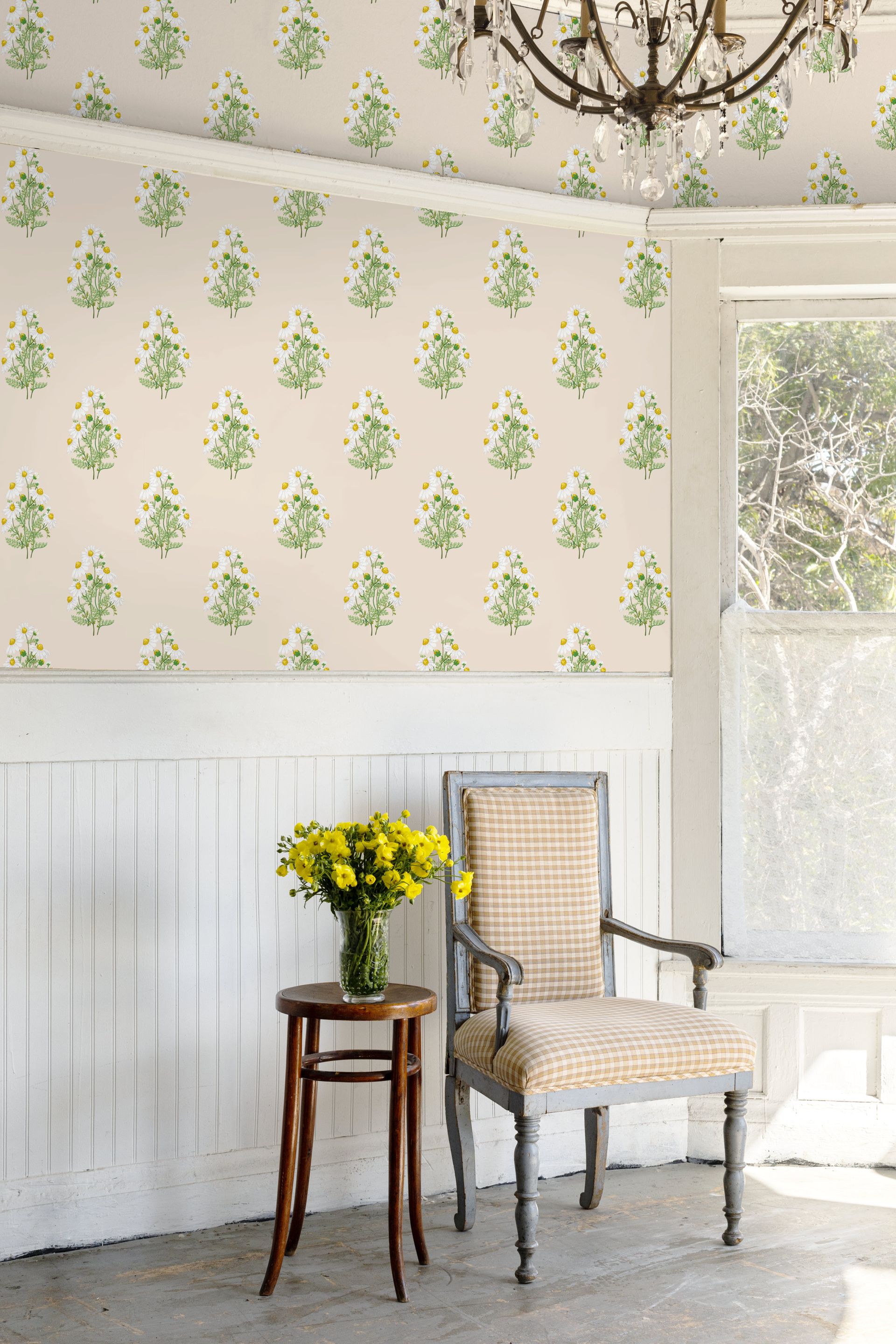
Temporary wallpaper is ideal if you're planning on decorating a rental, or if you're the sort of design enthusiast who likes to shake up your home's style regularly. 'Everyone deserves to create a space that feels like them, regardless of their circumstances,' says Jennifer. 'Removable wallpaper is a fantastic option for renters, people who love changing up their home regularly, and for those looking to be mindful of budget without sacrificing style.'
It's great for kids' rooms, too. We all know how quickly children's interests change, but removeable wallpaper makes it easier to design a room that suits their style more quickly, easily and cheaply than regular wallpaper.
Unlike regular pasted wallpaper, you can also reposition temporary wallpaper plenty of times during installation if you fail to align it completely straight first time round. As James Mellan-Matulewicz, Creative Director and Designer at Bobbi Beck, explains: 'Its tacky backing can be stuck down and removed hundreds of times without losing adhesion.'
Is it safe to use on your walls?

It certainly sounds promising so far, but there's still a niggling question at the back of our brains: is removeable wallpaper really safe for our walls? Surely an adhesive that's strong enough to hang wallpaper is likely to cause peeling to the wall's surface during removal?
According to Jennifer, as long as you remove it correctly (see below) it's totally safe. 'The adhesives are formulated to be strong enough to last until you’re ready for a change, yet gentle enough to prevent peeling or other damage to your surfaces.' You can rest assured that you can keep up with changing wallpaper trends without having to worry about your walls!
For those worried about the potentially harmful effects of the glue, we can put your concerns to rest, also. As Nathan notes: 'Wallshoppe's paper is PVC free and non toxic (we don’t use Vinyls) and contains no VOC’s which means there are no toxic odors or gases to worry about. We use a non toxic water based latex ink which makes it ideal for nurseries and kids rooms.' Always check with each individual manufacturer if you're worried about toxins or off-gassing.
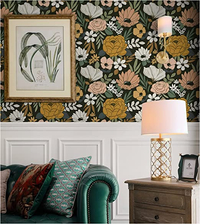
Vintage floral peel & stick wallpaper, at Amazon
Step back in time with the subtle pink and orange hues in this temporary wallpaper, perfect for the 70s revival feel. The textured material is re-positional and easily removable, and also features a grid measurement on the backing paper to make cutting to size simple. We're totally smitten.
How do you apply (and remove) temporary wallpaper?
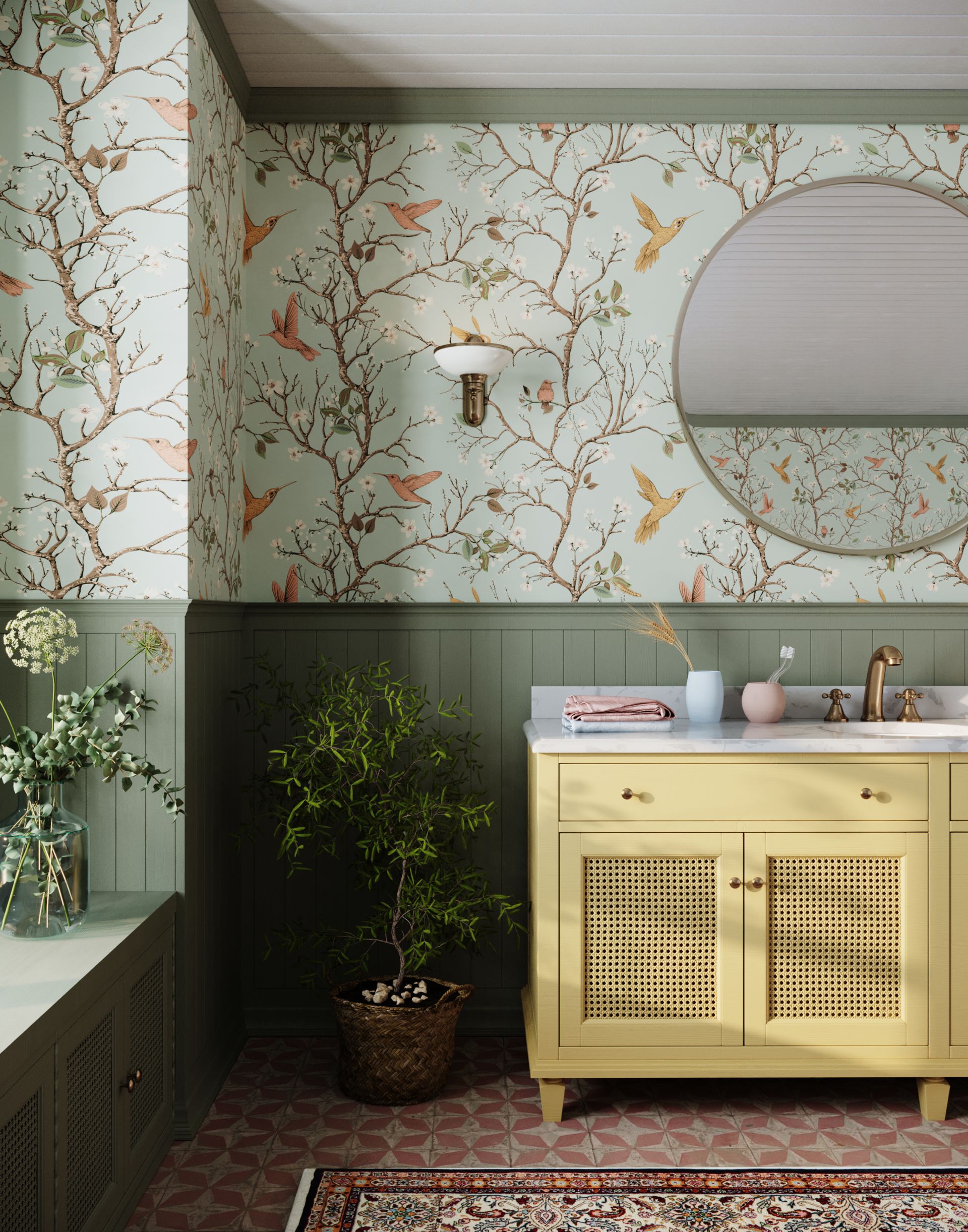
When it comes to how to wallpaper a room with the temporary kind, you won't be following the traditional method you're probably familiar with. You'll be pleased to hear that it's actually a far lot easier.
'Simply peel back the liner, place the paper on the surface and use a soft spatula or a roller to activate the adhesive,' says Nathan. 'You can remove it by pulling the top corner and peeling it off softly. There should be minimal to no damage to the walls.'
Jennifer recommends using a plastic smoother to push out air bubbles when hanging peel and stick wallpaper. 'Work from the center of the wallpaper strip to the outer edges,' she advises. 'As tempting as it might be to just use your hands, the extra pressure from using a plastic smoother ensures all air pockets are worked out and that your removable wallpaper properly adheres.' We like this one, in a handy wallpaper smoothing kit from Amazon.
When should you avoid using temporary wallpaper?
There's clearly a lot to love about temporary wallpaper – and we wouldn't blame you for rushing out to buy some beautiful designs as soon as you're finished reading – however, there are a few things you ought to know before you do.
Unfortunately, removeable wallpaper isn't suitable for every type of wall. For example, if your walls are particularly old and heavily textured, or there are visible flaky spots, you'll have a hard time making your wallpaper adhere to the wall.
You should also consider the type of space that you're planning on wallpapering, too. As Nathan explains: 'Spaces that are exposed to high humidity or direct contact with water should be avoided.' This means you should steer clear of steamy spaces. Sadly, temporary wallpaper isn't the best choice for a bathroom wallpaper idea.
If there are any signs of damp or mould on your walls you definitely shouldn't wallpaper over them either since this will also weaken the adhesive. (If you're renting, make sure to alert your landlord or maintenance team, too.)
Otherwise, you're free to safely wallpaper your home without the hassle of preparation, tricky application, or risky removal. Time to decorate to your heart's content!
Be The First To Know
The Livingetc newsletter is your shortcut to the now and the next in home design. Subscribe today to receive a stunning free 200-page book of the best homes from around the world.

Lilith Hudson is the News Editor at Livingetc, and an expert at decoding trends and reporting on them as they happen. Writing news, features, and explainers for our digital platform, she's the go-to person for all the latest micro-trends, interior hacks, and color inspiration you need in your home. Lilith discovered a love for lifestyle journalism during her BA in English and Philosophy at the University of Nottingham where she spent more time writing for her student magazine than she did studying. After graduating, she decided to take things a step further and now holds an MA in Magazine Journalism from City, University of London, with previous experience at the Saturday Times Magazine, Evening Standard, DJ Mag, and The Simple Things Magazine. At weekends you'll find her renovating a tiny one-up, one-down annex next to her Dad's holiday cottage in the Derbyshire dales where she applies all the latest design ideas she's picked up through the week.
-
 How to Thaw a Frozen Pipe — Learn Everything You Need to Know in 5 Minutes With This Guide
How to Thaw a Frozen Pipe — Learn Everything You Need to Know in 5 Minutes With This GuideWinter storm caught you off guard? We asked an expert — just how do you thaw a frozen pipe?
By Hugh Metcalf Published
-
 The 12 Very Best Silk Bedding Pieces — As Our Style Editor Says: 'It's What Dreams Are Made Of!'
The 12 Very Best Silk Bedding Pieces — As Our Style Editor Says: 'It's What Dreams Are Made Of!'Slumber in lustrous luxury with the very best silk bedding sheets, duvets, pillowcases, and more — your sleep score will thank us later
By Julia Demer Published

